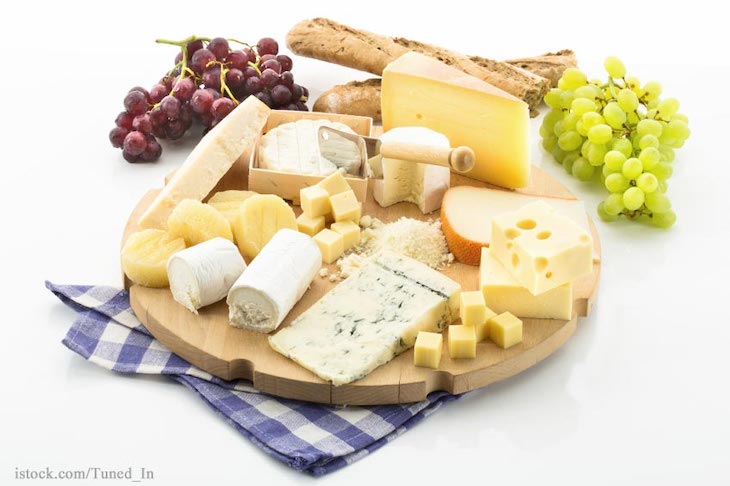Which foods may be contaminated with Listeria monocytogenes bacteria? Outbreaks of listeriosis, the illness caused by this pathogen, that have been linked to these kinds of foods go back to 1985. The Centers for Disease Control and Prevention have put together a list of foods that people in high risk groups should avoid.

While any food can be contaminated with this pathogen, the foods that are most likely to be contaminated with Listeria monocytogenes include deli meats, hot dogs, dairy products such as soft cheese, raw milk, and ice cream, and produce such as celery, sprouts, and cantaloupe. People who are at high risk for serious complications from a Listeria monocytogenes food poisoning infection should think about avoiding these foods unless they are cooked to 165°F.
Those at high risk for serious complications from this infection include the very young, the elderly, pregnant women, people with compromised immune systems, and anyone with a chronic disease such as diabetes.
Soft Cheeses
Soft cheeses made with raw or unpasteurized milk are 50 to 160 times more likely to cause Listeria infections than when they are made with pasteurized milk. Before you buy these products, such as queso fresco, queso blanco, brie, Camembert, feta, and blue-veined cheeses, make sure they are made with pasteurized milk.
Unfortunately, these products made with pasteurized milk have also caused illness, because of unsanitary conditions or because the pathogen is established in the facility’s environment. In the first Listeria outbreak in 1985, raw milk was inadvertently introduced into the pasteurized milk. And in 2015, a listeriosis outbreak that sickened 30 people in 10 states over 5 years was linked to Karoun Dairy soft cheeses. Three people died and one woman suffered a fetal loss.
If you are in a high risk group, just avoid eating these soft cheeses.
Raw Sprouts
Raw sprouts are considered an inherently risky product, since their growing conditions are perfect for bacterial growth, and because the seeds themselves may be contaminated with Listeria Monocytogenes and other pathogens. A deadly Listeria monocytogenes outbreak in 2014 linked to Wholesome Soy raw sprouts sickened five people and killed two.
Food safety experts tell people in high risk groups to avoid raw sprouts of any kind, or cook them before eating. Rinsing sprouts won’t remove any bacteria inside the seeds. And sprouting seeds at home won’t protect you.
Melons
This fruit produced and sold by Jensen Farms caused a huge deadly listeriosis outbreak in 2011, sickening 146 people in 28 states. Thirty people died. The issue with melons is that their deeply crenelated surfaces provide ideal hiding places for pathogens. And because they are grown directly on the soil, any soil contamination is easily transferred to the fruit.
If you are in a high risk group, think about not purchasing cut melons. Cut melon, even if you prepare it at home, should be refrigerated promptly and discarded after 7 days. Throw away any cut melons that are left at room temperature for more than 4 hours.
You may want to consider treating the whole melons you buy in very hot water to kill any bacteria on the rind. Do this before cutting the fruit, because the knife can drag bacteria from the surface to the interior. Note that this method isn’t guaranteed to kill all pathogens on the fruit.
Hot Dogs, Pate, Lunch Meats, and Cold Cuts
Delis have been the source of several listeriosis outbreaks in the past, including an outbreak last year that sickened 10 people. The ability of the pathogen to establish itself, especially in moist and cool environments, factors into this risk.
Everyone should protect themselves by preventing juices from hot dog and lunch meats from getting on uncooked foods and kitchen surfaces. Store factory-sealed lunch and deli meats no longer than 2 weeks in the fridge. Opened packages and meat sliced at a deli should be stored no longer than 3 to 5 days in the fridge.
People in high risk groups should not eat deli meats, hot dogs, lunch meats, cold cuts, refrigerated pates or refrigerated meat spreads unless they are heated to 165°F. Spreads and pates that are sealed in cans, jars, or pouches are a safer choice.
Smoked Fish
Refrigerated smoked fish is a high risk food for listeriosis. Canned and shelf stable tuna, salmon, and fish products are not risky. But cold smoked fish such as salmon, whitefish, cod, tuna, trout, and mackerel are risky. These items may be labeled “nova-style,” “lox,” “kippered,” “smoked,” or “jerky.” These products are often found at seafood or deli counters.
These products can be thoroughly cooked before consumption to make them safer.
Raw Milk
Raw milk is milk that has not been pasteurized. Since a cow’s udders are close to her anus, pathogens can easily migrate into the milk. Raw milk is considered the riskiest food of all, not only for possible Listeria monocytogenes contamination, but for other pathogens such as Salmonella, E. coli, and Brucella.
Raw milk that is made into other products are as ice cream, yogurt, and soft cheeses have caused outbreaks. Make sure that these products are made with pasteurized milk before you buy them.
Ice Cream
Ice cream made with pasteurized milk has caused listeriosis outbreaks. In 2018, three people were sickened with listeriosis linked to Working Cow ice cream. And in 2015, a deadly Listeria monocytogenes outbreak was linked to Blue Bell ice cream.




